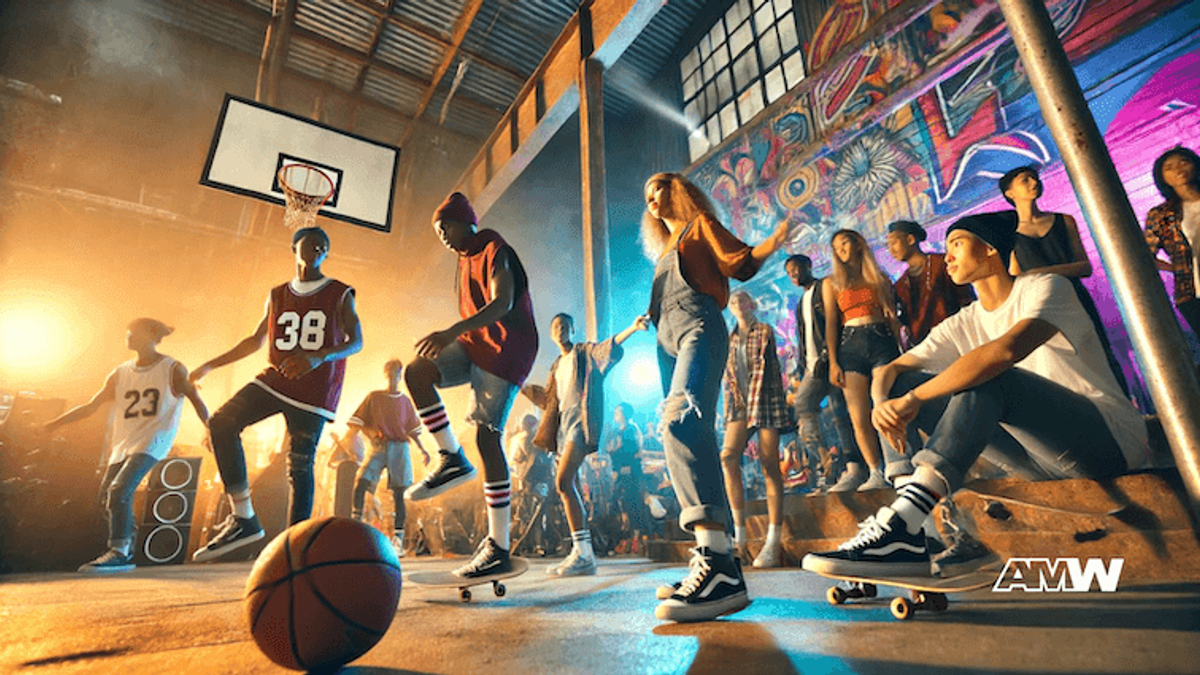Sport and Entertainment Marketing: From Stadiums to Social Media

Over the years, there has been a drastic change in the field of sport entertainment marketing. What began as conventional methods like stadium advertising and radio promotions have now advanced into sophisticated digital strategies.
Quick Summary
The evolution of sports entertainment marketing reflects a shift from traditional methods like stadium advertising to innovative digital strategies. This transition emphasizes the importance of fan engagement and brand visibility. Marketers leverage both conventional and digital techniques to enhance audience interaction, maximize awareness, and foster loyalty. By understanding fan behaviors and utilizing personalized campaigns, businesses can effectively boost involvement and drive revenue, ens
This transition is a reflection of how dynamic sports and entertainment industries are as they keep up with emerging technologies and shifting consumer behaviours.
Knowledge about sports and entertainment marketing is essential for one to remain competitive in today's world. The area covers various marketing strategies used to promote sporting events or entertainment shows that aim at reaching wider audiences than ever before. Successful promotion within this sector requires using traditional methods together with innovative digital approaches so as to connect with fans as well as customers throughout their lifetime value.
Ready to Grow Your Business?
Get a custom strategy tailored to your goals.
This blog post will discuss the impact brought about by changing from traditional to digital techniques on marketing of sports events and shows. We shall look at what constitutes sport entertainment marketing foundationally; different objectives behind diverse promotional campaigns plus how these initiatives heighten fan involvement and enhance brand recognition.
The Foundations of Sport & Entertainment Marketing

Definition & Scope
Sports entertainment marketing refers to numerous tactics employed to create awareness about various games or performances among people who could eventually become die-hard supporters. It involves both athletes teams' connection with fans through personal level relations building activities such as signing autographs during meet-and-greet sessions backstage after concerts etcetera while still focusing on wider aspects related not only to sports but also show business industry generally which makes it an integral part of wider-ranging sports and entertainments sectors.
Effective sports and entertainment promotion entails publicizing major events, whether they are live matches or large-scale concerts, where many individuals gather together under the same roof at a given time period for fun purposes, mainly because these gatherings offer great opportunities for marketers seeking to engage the masses easily thus capturing their attention quickly. For instance, brands may choose to advertise their products or services through banner ads displayed all around stadiums during game breaks, while celebrities can be invited to grace such occasions, which makes them appear more glamorous than before.
Key Objectives
The primary goals of sports and entertainment marketing revolve around increasing fan engagement, raising brand awareness, and generating profits. Managers in charge of marketing use different methods in order to achieve these objectives, which may involve targeted promotions, time-limited discounts, and loyalty schemes, among others. Many people attend major events due to this reason alone, but it is also important for organizations to foster a sense of community around their brands or teams, especially during such gatherings.
By using targeted promotions coupled with limited-time offers, marketing campaigns can effectively capture new customers while encouraging repeat visits during the same period. Another powerful tool used is loyalty programs, which reward fans who have been following particular artiste shows over time; this acts as an incentive for them not only to continue attending those concerts but also to try out other related activities organized by the same company behind such events. These schemes could include giving people access to exclusive content like virtual reality experiences plus seasonal offers with special privileges attached so that they keep coming back.
Positive review creation and online reputation management are also crucial elements towards achieving success in marketing within the sports & entertainment industry. This is because data-driven insights enable advertisers to tailor-make their messages differently depending on the various segments they intend to target, thereby ensuring deeper resonance with respective audiences through a proper understanding of what makes them tick. Marketers should, therefore, strive to deliver personalized encounters designed around individual preferences based on knowledge about fan behaviors.
Ready to Grow Your Business?
Get a custom strategy tailored to your goals.
In a nutshell, game entertainment marketing is a complex area that combines conventional and digital advertising techniques to captivate fans and drive business growth. Managers should create campaigns which resonate with the audience and foster long-term loyalty by striving towards such goals as fan involvement, brand visibility, revenue generation among others. It is important however for one not to be caught off guard by new technologies or current trends in sports plus other showbiz industries if they want their success stories to continue.
Traditional Marketing In Sports And Entertainment

Stadium And Venue Marketing
Historically speaking, many promotions within sports events or any form of entertainment relied heavily on face-to-face encounters as well as media advertisements broadcasted through various channels. This includes billboards placed around stadiums or banners hung up high above an arena floor during basketball games, among other things. All this was done in order to capture the attention of those attending live games, hence creating brand awareness while still keeping teams at heart, the minds of loyal supporters who always found themselves within these venues cheering them on.
Not only does stadium & venue marketing help to advertise major events but it also serves as a means building up excitement towards them too. The visual impact brought about by large scale adverts can make watching matches more memorable thereby improving overall fan experience; additionally doing so allows companies know better their clients thus establishing closer relations with them.
Apart from physical ads shown on site at sporting fixtures, there has been a history of partnerships between TV/radio stations with sports teams/entertainment providers being forged over the years gone by, which have proved vital when coupled together, forming part of what is considered traditional advertising methods used within these sectors. Such associations ensure wider coverage beyond those physically present through live broadcasts that offer play-by-play commentary supported by analysis before and after games are played out, i.e., they provide context around what happened during pre-recorded highlights packages aired later, etc., all aimed at getting people talking more about sport or upcoming concerts than would otherwise be the case if such were not done.
Media Partnerships

This is another aspect of traditional showbiz marketing that has not lost relevance. For instance, television and radio stations still play a big role when it comes to attracting larger audiences for various events within the sports or entertainment industry by providing live coverage as well as engaging commentary during matches, among other things. However, there are more ways to do so these days. For example, broadcasters can now air pre-game shows and post-game analysis features on athletes while performing artists get interviewed before their concerts, etc., all aimed at building momentum ahead of time, thus ensuring repeat attendance from viewers who had been enticed by what was promised them through those broadcasts initially.
Although radio lacks visual impact like its TV counterpart, this does not mean that people should underestimate the power behind the microphone because there are many ways in which one could use radio to reach out to large numbers, especially if they happen to always move. Some examples include broadcasting talk shows where personalities talk about different aspects surrounding respective fields of interest such as sports programming or any other related topic area; conducting interviews with prominent figures belonging to world-renowned sports teams/organizations, among others things; airing live updates during games played between local rivals at times when most commuters would have tuned into station either coming from work going home thus attracting huge following, etc.
Events can gain popularity and attract people by promoting them through the print media like newspapers and magazines. Such conventional platforms have articles, interviews, or critics which engage readers at a deeper level. Reputable publications featuring positive reviews or stories about an event make it credible and appealing therefore drawing more participants who wouldn't have been reached via other means.
Ready to Grow Your Business?
Get a custom strategy tailored to your goals.
Over the years, stadium marketing blended with strong media alliances has proved to be a successful promotional method. The strategies guarantee a wide coverage area, maximum brand visibility, and continuous interaction with fans, thus forming a sturdy base for current digital-centered advertising campaigns in the sports and entertainment industry. Managers achieve this by using not only emerging techniques but also traditional methods so that their marketing messages can resonate with audiences across all levels of understanding while driving growth in various sectors of the business.
Conclusion

In summary, sports entertainment marketing has changed tremendously over time, where olden days' practices were mixed up together with new age digital plans so as to widen its reach among different types of people. What used to happen within stadiums alone now takes place on social media, too; this shift not only revolutionized how individuals relate to games but also created additional avenues through which money can be made and brands developed. It is important for promoters and enterprises seeking success in these fields to keep pace with such changes because failure may result in losing touch with contemporary society's interests in sports or other forms of amusement.
Frequently Asked Questions

What is sports entertainment marketing?
Sports entertainment marketing is the application of methods and tricks for advertising sports events, teams, and entertainment shows to interact with fans and increase revenue. It combines traditional marketing features with modern digital techniques in order to produce inclusive campaigns that appeal to people.
What counts as sports entertainment?
By definition, sports entertainment entails professional or amateur contests of athleticism in addition to promoting sports clubs and athletes and their respective activities aimed at entertaining viewers or followers. This may involve such things as live shows, broadcasts, or digital content related to athletics.
What does someone who works in sports marketing do?
A person working in this field will design advertising projects which are supposed to advertise sporting events, teams as well as players. Their responsibilities include sponsorship management, advertisement creation & placement, public relations efforts coordination, and online/offline fan engagement program management, among others.
What is sports marketing and entertainment about?
The main aim of sports marketing, together with show business, lies within holding promotions for different types of games while using various means so as to attract people who would watch them either once or repeatedly. Such campaigns should be able to make individuals feel more connected to their teams through personal engagements backed up by traditional media alongside digital platforms aimed at enhancing the fan experience.
What do you learn in a sports and entertainment marketing class?
When studying this course, one gets acquainted with principles used during promotional activities, specifically when dealing with games or other forms of amusement. Additionally, those taking up these subjects will also have an opportunity to carry out market research relating to consumer behavior patterns vis-à-vis branding strategies adopted within such sectors, including digital advertisement creation tailored for use during sporting events, among others.
What are the competencies required for success in sports and entertainment marketing careers?
Some important skills needed for success in careers involving engaging oneself in salesmanship services-related performances include strategic planning skills, digital marketing expertise, brand management knowledge, fan engagement capacity-building abilities, data analytics techniques, and finally, relationship establishment strategies with different stakeholders within that industry like clubs or associations. All these competencies will enable marketers to effectively promote sports events or shows as well as attain business goals.
Ready to Grow Your Business?
Get a custom strategy tailored to your goals.
Frequently Asked Questions
What is sport and entertainment marketing and what does it include?
Sport and entertainment marketing encompasses various strategies used to promote sporting events, teams, athletes, concerts, and entertainment shows to build fan engagement and brand awareness. It includes stadium advertising, digital campaigns, social media marketing, sponsorship deals, media partnerships, and fan loyalty programs. The field combines traditional methods like venue signage and radio promotions with modern digital approaches including targeted social media ads and data-driven personalization to connect with audiences across multiple touchpoints.
How has sports marketing evolved from traditional to digital methods?
Sports marketing has transformed from primarily stadium-based advertising and radio/TV partnerships to sophisticated digital strategies. Traditional methods focused on billboards, venue signage, and broadcast media partnerships. Today's approach integrates social media campaigns, influencer partnerships, virtual reality experiences, targeted online advertising, and data analytics. This evolution allows marketers to reach global audiences, create personalized fan experiences, track engagement metrics in real-time, and build year-round relationships with fans beyond just game days.
What are the main objectives of sports and entertainment marketing campaigns?
The primary objectives include increasing fan engagement, raising brand awareness, generating revenue, and building long-term loyalty. Marketers achieve these goals through targeted promotions, limited-time offers, exclusive content access, and loyalty programs that reward repeat attendance. Additional objectives include creating community around brands, improving online reputation, driving ticket sales, and fostering emotional connections between fans and teams or artists. Success is measured through attendance figures, social media engagement, merchandise sales, and customer lifetime value.
How do stadium and venue marketing strategies work in sports marketing?
Stadium and venue marketing utilizes physical spaces to create brand awareness through strategically placed billboards, banners, digital displays, and sponsorship signage visible to live audiences. These strategies enhance fan experience by creating memorable visual impacts and building excitement around events. Venue marketing also includes naming rights deals, concession partnerships, and experiential activations that allow brands to interact directly with fans. The captive audience environment provides high engagement rates and helps establish emotional connections between brands and supporters.
What role does social media play in modern sports and entertainment marketing?
Social media has become essential for real-time fan engagement, content distribution, and community building in sports and entertainment marketing. Platforms enable direct athlete-fan interactions, behind-the-scenes content sharing, live event coverage, and viral marketing campaigns. Marketers use social media for targeted advertising based on fan demographics and interests, influencer partnerships, user-generated content campaigns, and crisis management. It provides measurable metrics, enables global reach regardless of geographic location, and facilitates year-round engagement between events.
How do loyalty programs work in sports and entertainment marketing?
Loyalty programs in sports and entertainment reward repeat customers with exclusive benefits like priority ticket access, meet-and-greet opportunities, merchandise discounts, and VIP experiences. These programs collect valuable fan data to enable personalized marketing, predict attendance patterns, and increase customer lifetime value. Successful programs often include tiered membership levels, points-based rewards systems, mobile apps for easy access, and exclusive content like virtual reality experiences or behind-the-scenes footage that keeps fans engaged between events.
What are the key differences between traditional and digital sports marketing strategies?
Traditional sports marketing relies on physical advertising (stadium signage, print media), broadcast partnerships, and face-to-face interactions with limited audience reach and measurement capabilities. Digital strategies offer global reach, real-time engagement, precise targeting based on demographics and behavior, measurable ROI through analytics, and interactive experiences like virtual reality. Digital approaches enable personalized content delivery, social media community building, and continuous fan engagement, while traditional methods provide high-impact visual presence and credible media partnerships for broader audience exposure.
Related Resources
Calculators
Pricing Guides
Key Terms
Optimization of individual web page elements including content, HTML source code, and meta tags to rank higher in search results.
Keyword DifficultyA metric estimating how hard it would be to rank on the first page of search results for a specific keyword.
Content DecayThe gradual decline in organic traffic and rankings that content experiences over time as it becomes outdated or outranked.
Brand SalienceThe degree to which your brand comes to mind quickly and easily when customers think about your product category.
Answer Engine OptimizationOptimizing content for AI answer engines and conversational search interfaces.
Related Articles

Integrated Marketing Communications for Brand Success
Ever wonder how some brands seem to be everywhere you look, always delivering the same message? It's the magic of Integrated Marketing Communications (IMC) at work. What Exactly Is Integrated M

Outbound Marketing vs Inbound Marketing
In the world of marketing, businesses are constantly evaluating which approaches may yield effective results. "Outbound marketing vs inbound marketing" is a common debate for businesses aiming to

How to Choose a Lifestyle PR Agency That Transforms Your Brand's Story
In the dynamic world of brand building, lifestyle PR agencies have become essential partners for companies seeking to connect with their target audiences. These specialized firms craft compelling narr